
Jul 22, 2017 | Focolare Worldwide, Senza categoria
 Augustine provides us with one of the most valuable intuitions on prayer: “God’s ear hears the heart’s voice” (Comment on Psalm 148). Letting God’s ear rest on our heart, opening our heart to God’s ear: this is what it takes, this is the art of praying, an art, by the way, that’s for everyone. Actually, it’s not ours, but of the Spirit that God gives to us, the Spirit who prays in us, for we don’t know how or for what we should pray (cf Rm 8:26). […] Prayer is elevating the heart to God. But are we capable of that? Isn’t the range of our understanding too limited for our heart to be able to elevate itself to God? Isn’t the impulse of our heart too weak? Don’t burdens attach themselves to our heart and weigh on it, paralyze it and bring it down? What gives us the courage to claim: Our heart is turned to the Lord? His ear. He has lowered it to us. The Father listens to the Son. And the Son came down among us, into our flesh, into our heart. Within the heart of the Son, the Father listens to every beat of our heart, in the heart of the Son he finds our heart. In Him in whom we were made, loved, supported, gathered – the Father hears us. To elevate our heart means to leave it where it is and discover that where it is, with us, is the heart of God in the heart of his Son. Abandon yourself in Him and he will hold you. In Him, God’s ear is upon your heart; in Him your heart is at God’s ear. […] The opposite is just as true: God keeps his heart against your ear. He revealed, conveyed, gave, not something of Himself, but His Self. If you believe in him, if you adhere to Him, if you stick to Him, then you don’t hear a novelty, a directive, a command: you hear his heart. Stay near to Him until you discover this heart of yours. He’s in need of your patient listening in order to open your heart; actually, only patience comprehends love and learns love. He will reveal Himself to anyone who loves Him, and He makes His dwelling with that person (cf Jn 14:21-23). […] God has your heart at his ear, so that through your ear his heart penetrating your heart, might become your heart. The ear of God on your heart – the heart of God at your ear – like the alternating found in prayer. Only the pray-er knows God. Only the pray-er knows the human person. From Klaus Hemmerle, Con l’anima in ascolto, Guida alla preghiera,(Rome: Città Nuova Ed.,1989), 9-11.
Augustine provides us with one of the most valuable intuitions on prayer: “God’s ear hears the heart’s voice” (Comment on Psalm 148). Letting God’s ear rest on our heart, opening our heart to God’s ear: this is what it takes, this is the art of praying, an art, by the way, that’s for everyone. Actually, it’s not ours, but of the Spirit that God gives to us, the Spirit who prays in us, for we don’t know how or for what we should pray (cf Rm 8:26). […] Prayer is elevating the heart to God. But are we capable of that? Isn’t the range of our understanding too limited for our heart to be able to elevate itself to God? Isn’t the impulse of our heart too weak? Don’t burdens attach themselves to our heart and weigh on it, paralyze it and bring it down? What gives us the courage to claim: Our heart is turned to the Lord? His ear. He has lowered it to us. The Father listens to the Son. And the Son came down among us, into our flesh, into our heart. Within the heart of the Son, the Father listens to every beat of our heart, in the heart of the Son he finds our heart. In Him in whom we were made, loved, supported, gathered – the Father hears us. To elevate our heart means to leave it where it is and discover that where it is, with us, is the heart of God in the heart of his Son. Abandon yourself in Him and he will hold you. In Him, God’s ear is upon your heart; in Him your heart is at God’s ear. […] The opposite is just as true: God keeps his heart against your ear. He revealed, conveyed, gave, not something of Himself, but His Self. If you believe in him, if you adhere to Him, if you stick to Him, then you don’t hear a novelty, a directive, a command: you hear his heart. Stay near to Him until you discover this heart of yours. He’s in need of your patient listening in order to open your heart; actually, only patience comprehends love and learns love. He will reveal Himself to anyone who loves Him, and He makes His dwelling with that person (cf Jn 14:21-23). […] God has your heart at his ear, so that through your ear his heart penetrating your heart, might become your heart. The ear of God on your heart – the heart of God at your ear – like the alternating found in prayer. Only the pray-er knows God. Only the pray-er knows the human person. From Klaus Hemmerle, Con l’anima in ascolto, Guida alla preghiera,(Rome: Città Nuova Ed.,1989), 9-11.
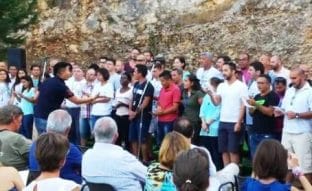
Jul 21, 2017 | Focolare Worldwide
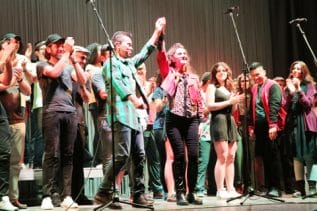 “Every life has hope.” This is the recurring theme of Fazenda da Esperança in all of its locations around the world. “We’ve seen and lived through hell, but during these days we’ve been changed into artists.” This was one of the statements gathered during an exchange of experiences at the conclusion of the five days of work that included two presentations of “Campus – The Musical”. A hundred and ten young people from Fazenda da Esperança and from Puglia, southern Italy, were prepared in workshops on dance, voice, theatre and percussion to then go out on stage with Gen Rosso at the Fasano city Kennedy Theatre for several scenes of Campus, last 7th and 8th of July. “We had to learn it fast and well in spite of the heat and our own limitations.” The motto helped: Welcome the different. There were people from 15 countries, from different cultures, age groups and backgrounds…”
“Every life has hope.” This is the recurring theme of Fazenda da Esperança in all of its locations around the world. “We’ve seen and lived through hell, but during these days we’ve been changed into artists.” This was one of the statements gathered during an exchange of experiences at the conclusion of the five days of work that included two presentations of “Campus – The Musical”. A hundred and ten young people from Fazenda da Esperança and from Puglia, southern Italy, were prepared in workshops on dance, voice, theatre and percussion to then go out on stage with Gen Rosso at the Fasano city Kennedy Theatre for several scenes of Campus, last 7th and 8th of July. “We had to learn it fast and well in spite of the heat and our own limitations.” The motto helped: Welcome the different. There were people from 15 countries, from different cultures, age groups and backgrounds…” 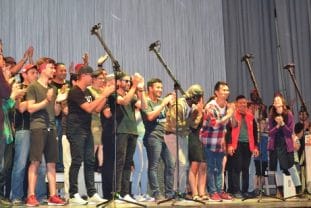 Our adrenaline was really pumping just as we got on stage to give the best of ourselves, while fear and worry seemed to disappear as we encouraged each another. Several said: “We felt a strength from above that was supporting us and instilling faith in ourselves.” “The thing I learned was never to stop during the show because of a mistake: this made me think a lot. I’ll carry this into my daily life, always continuing on in spite of the failures.”
Our adrenaline was really pumping just as we got on stage to give the best of ourselves, while fear and worry seemed to disappear as we encouraged each another. Several said: “We felt a strength from above that was supporting us and instilling faith in ourselves.” “The thing I learned was never to stop during the show because of a mistake: this made me think a lot. I’ll carry this into my daily life, always continuing on in spite of the failures.”  The inauguration of a new Fazenda da Esperança was held on Sunday, July 9, in Monopoli. It was attended by civil and religious leaders, Gen Rosso and a group of 60 youth “missionaries” from the Fazende, who came from around the world, together with their founders. The experience of several young people who had been in prison and were now helping other young people like themselves, was quite meaningful. “For us from Gen Rosso,” Franco explains, “collaborating with the Fazenda, as we have been for many years, is always a great enrichment and gives a decisive push to welcome the strong signs of hope that can be found anywhere in the world.” The festival concluded with the singing of Io ero lì (I’ve been there), a song written by Gen Rosso in tribute to Fazenda da Esperança. Gustavo Clariá
The inauguration of a new Fazenda da Esperança was held on Sunday, July 9, in Monopoli. It was attended by civil and religious leaders, Gen Rosso and a group of 60 youth “missionaries” from the Fazende, who came from around the world, together with their founders. The experience of several young people who had been in prison and were now helping other young people like themselves, was quite meaningful. “For us from Gen Rosso,” Franco explains, “collaborating with the Fazenda, as we have been for many years, is always a great enrichment and gives a decisive push to welcome the strong signs of hope that can be found anywhere in the world.” The festival concluded with the singing of Io ero lì (I’ve been there), a song written by Gen Rosso in tribute to Fazenda da Esperança. Gustavo Clariá
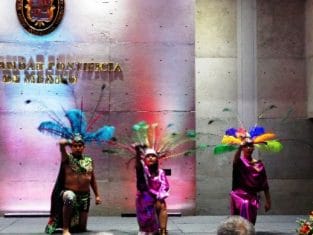
Jul 20, 2017 | Focolare Worldwide, Senza categoria
1944: Chiara Lubich left her beloved books in the attic to join the school of the one teacher, Jesus, leaving behind her dream to study philosophy at Catholic University, where she had thought she would be able to know God. Fifty-three years later, Catholic University of Mexico City conferred on her an honorary doctorate in philosophy.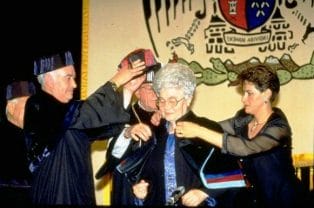 It’s been 20 years since the honorary doctorate, and the Focolare community in Mexico organized three events in memory of her message and to fulfill it: the philosophy of being, the Church as communion, and inculturation. June 29, 2017: “The face of God as communion” was the title of the symposium held at the Pontifical University of Mexico. Msgr Piero Coda, Dean of the Sophia University Institute, conducted two conferences: “Pope Francis: four points for an emerging Church” and “Chiara Lubich: a mysticism of ‘us’ to live through the change.” T
It’s been 20 years since the honorary doctorate, and the Focolare community in Mexico organized three events in memory of her message and to fulfill it: the philosophy of being, the Church as communion, and inculturation. June 29, 2017: “The face of God as communion” was the title of the symposium held at the Pontifical University of Mexico. Msgr Piero Coda, Dean of the Sophia University Institute, conducted two conferences: “Pope Francis: four points for an emerging Church” and “Chiara Lubich: a mysticism of ‘us’ to live through the change.” T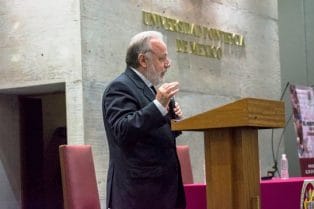 hese two reflections urged those present, mostly priests and men and women religious, towards pastoral work that shows a Church that is merciful, synodal, humble and open. “What surfaced,” affirmed Msgr Coda, “is the need to maintain an open dialogue with the vibrant strength that is in the Mexican church, to enthusiastically take up the challenge of pastoral change as advocated by Pope Francis. This encourages efforts by the laity at a cultural and societal level, working closely with young people, and the work of synods in the Church, where charisms can give their contribution.” June 30, 2017: Welcoming everyone to the hall at La Salle University in Mexico City, Dr Enrique Alejandro González Alvarez, dean of the university, explained the importance of the honoris causa doctorate conferred on Chiara Lubich in 1997. “Through her acceptance, it was she who honored the university,” he said, pointing to the profound harmony between the charism of unity and that of La Salle. “The University identifies with the Focolare Movement, because we work as allies to bring the kingdom of God here on earth, which without a doubt was Chiara’s primary mission,” Alvarez said. “May we continue to tighten the bonds that unite us. This is not only Chiara Lubich’s home, but of all who carry on in her spirit, so that today she can continue to live through her followers.” For the occasion Msgr Coda conducted a conference on “Chiara Lubich’s contribution to a new philosophy of being.” “Chiara’s speech 20 years ago,” Coda said, “showed itself to be prophetic for Mexico, as a new search for meaning and light, and the need for a new cultural paradigm at the social and cultural level. So her talk gave direction and can be connected to the commitment of Sophia University Institute.” New contacts and plans to collaborate were established between Sophia University Institute, the Pontifical University of Mexico and La Salle University.
hese two reflections urged those present, mostly priests and men and women religious, towards pastoral work that shows a Church that is merciful, synodal, humble and open. “What surfaced,” affirmed Msgr Coda, “is the need to maintain an open dialogue with the vibrant strength that is in the Mexican church, to enthusiastically take up the challenge of pastoral change as advocated by Pope Francis. This encourages efforts by the laity at a cultural and societal level, working closely with young people, and the work of synods in the Church, where charisms can give their contribution.” June 30, 2017: Welcoming everyone to the hall at La Salle University in Mexico City, Dr Enrique Alejandro González Alvarez, dean of the university, explained the importance of the honoris causa doctorate conferred on Chiara Lubich in 1997. “Through her acceptance, it was she who honored the university,” he said, pointing to the profound harmony between the charism of unity and that of La Salle. “The University identifies with the Focolare Movement, because we work as allies to bring the kingdom of God here on earth, which without a doubt was Chiara’s primary mission,” Alvarez said. “May we continue to tighten the bonds that unite us. This is not only Chiara Lubich’s home, but of all who carry on in her spirit, so that today she can continue to live through her followers.” For the occasion Msgr Coda conducted a conference on “Chiara Lubich’s contribution to a new philosophy of being.” “Chiara’s speech 20 years ago,” Coda said, “showed itself to be prophetic for Mexico, as a new search for meaning and light, and the need for a new cultural paradigm at the social and cultural level. So her talk gave direction and can be connected to the commitment of Sophia University Institute.” New contacts and plans to collaborate were established between Sophia University Institute, the Pontifical University of Mexico and La Salle University. The Focolare community threw a celebration in honor of June 7, 1997, together with the apostolic nuncio, Msgr Franco Coppola, and the Dean of the Pontifical University of Mexico, Dr Mario Ángel Flores Ramos. There was music, dance, video and testimonies from those present on that memorable day, which served as the perfect context to rediscover the depth of Chiara Lubich’s message. “In the basilica of the Madonna of Guadalupe,” said Maria Voce in her message to the Mexican community, “in front of the ‘Morenita,’ Chiara highlighted the wonderful symbols that Mary clothed herself in, presenting her as an extraordinary example of inculturation.” Chiara’s legacy, which obviously echoed the original message of Guadalupe, still strongly resonates, Focolare’s president said. “Let’s entrust ourselves to her, icon of the ‘culture of meeting,’ so that we might fully ‘make ourselves one’ and bring the spirituality of communion everywhere.”
The Focolare community threw a celebration in honor of June 7, 1997, together with the apostolic nuncio, Msgr Franco Coppola, and the Dean of the Pontifical University of Mexico, Dr Mario Ángel Flores Ramos. There was music, dance, video and testimonies from those present on that memorable day, which served as the perfect context to rediscover the depth of Chiara Lubich’s message. “In the basilica of the Madonna of Guadalupe,” said Maria Voce in her message to the Mexican community, “in front of the ‘Morenita,’ Chiara highlighted the wonderful symbols that Mary clothed herself in, presenting her as an extraordinary example of inculturation.” Chiara’s legacy, which obviously echoed the original message of Guadalupe, still strongly resonates, Focolare’s president said. “Let’s entrust ourselves to her, icon of the ‘culture of meeting,’ so that we might fully ‘make ourselves one’ and bring the spirituality of communion everywhere.”
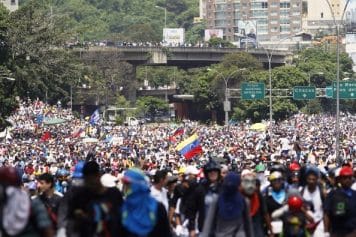
Jul 17, 2017 | Focolare Worldwide
I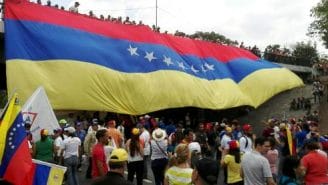 heard on TV… I’m watching the news, continually being interrupted by appeals from the public utility commission. The last one just said: “Urgently needed pharmacy drug…” My God! I jot down the telephone number and call. They tell me that person in need is an elderly woman, that it’s really urgent and that she lives in the same city as me. I quickly contact the lady’s children, but in this moment the situation on the streets doesn’t allow me to go out. We agree to meet the next day, early in the morning, in fron of the community health centre. When we finally meet, the lady asks me: “How much does the medicine cost?” I asked for it from the United States, but they weren’t able to send it to me.” “Nothing, ma’am,” I answer. “Let’s pray together that peace quickly returns to Venezuela.” We don’t know each other but hug and say goodbye. There is more happiness in giving than in receiving My friend calls me: “Do you by any chance have this medicine? I can’t find it anywhere . . .” It happened to be just the medicine that a woman had donated to my parish. In that moment I had thought: “But will this be useful to anyone?” It’s a very specific medicine…” It was jus the one my friend needed, with the exact dosage information – and there were 50 pills! God knows what each person needs. The happiness was shared, but mine was greater.
heard on TV… I’m watching the news, continually being interrupted by appeals from the public utility commission. The last one just said: “Urgently needed pharmacy drug…” My God! I jot down the telephone number and call. They tell me that person in need is an elderly woman, that it’s really urgent and that she lives in the same city as me. I quickly contact the lady’s children, but in this moment the situation on the streets doesn’t allow me to go out. We agree to meet the next day, early in the morning, in fron of the community health centre. When we finally meet, the lady asks me: “How much does the medicine cost?” I asked for it from the United States, but they weren’t able to send it to me.” “Nothing, ma’am,” I answer. “Let’s pray together that peace quickly returns to Venezuela.” We don’t know each other but hug and say goodbye. There is more happiness in giving than in receiving My friend calls me: “Do you by any chance have this medicine? I can’t find it anywhere . . .” It happened to be just the medicine that a woman had donated to my parish. In that moment I had thought: “But will this be useful to anyone?” It’s a very specific medicine…” It was jus the one my friend needed, with the exact dosage information – and there were 50 pills! God knows what each person needs. The happiness was shared, but mine was greater.  Create bridges with people from other Churches I received an SMS: “I would need this medicine, do you have it by chance?” Yes, I had it and asked Armando to take it over to him, since the one asking was an Evangelical like him. I also thought of asking: “If by any chance you any medicine that we’re looking for, would you return the favor?” She sent me the exact medicine that is hard to find in pharmacies, equipped with a nebulizer. She gave mine to another person who wasn’t able to expectorate because of a strong cough. I was an experience of the Gospel sentence: “Give and it will be given to you.” Moreover, the medicine I received was of a superior quality and with fewer side effects than the one I had before. It’s amazing: when you give, love is transformed into brotherhood. Sunday, day of rest… It’s Sunday!!! Finally I can get some rest! I planned on a very interesting film when, all of a sudden, the doorbell rings. I begin to fear that rest in relaxation is in danger. Seeing my reaction, my son asked if I would like him to tell the person at the door to come back at a nother moment. I almost say yes . . . but no . . . I’ll open it. I see an acquaintance standing there who asks me if I’m busy. She had an urgent look on her face. I let her in. “I just ahvef to talk with you…” “Okay, come in. My husband’s here too. Is it okay if he joins us?” We sit there for three hours listening to her. She tell us she wants a divorce, but before telling it to her husband and filing the papers, she thought of talking to us. It’s not easy to listen to her venting filled with pain, misunderstanding and anger…At the end, many of her doubts are clarified. We conclude with a prayer and the decision to start being the first to love. Thus she returns home with renewed strength and ready for the fight to save her marriage. It was a Sunday spent as the Day of the Lord, in which we think we did what Jesus would have done – loved without judging.
Create bridges with people from other Churches I received an SMS: “I would need this medicine, do you have it by chance?” Yes, I had it and asked Armando to take it over to him, since the one asking was an Evangelical like him. I also thought of asking: “If by any chance you any medicine that we’re looking for, would you return the favor?” She sent me the exact medicine that is hard to find in pharmacies, equipped with a nebulizer. She gave mine to another person who wasn’t able to expectorate because of a strong cough. I was an experience of the Gospel sentence: “Give and it will be given to you.” Moreover, the medicine I received was of a superior quality and with fewer side effects than the one I had before. It’s amazing: when you give, love is transformed into brotherhood. Sunday, day of rest… It’s Sunday!!! Finally I can get some rest! I planned on a very interesting film when, all of a sudden, the doorbell rings. I begin to fear that rest in relaxation is in danger. Seeing my reaction, my son asked if I would like him to tell the person at the door to come back at a nother moment. I almost say yes . . . but no . . . I’ll open it. I see an acquaintance standing there who asks me if I’m busy. She had an urgent look on her face. I let her in. “I just ahvef to talk with you…” “Okay, come in. My husband’s here too. Is it okay if he joins us?” We sit there for three hours listening to her. She tell us she wants a divorce, but before telling it to her husband and filing the papers, she thought of talking to us. It’s not easy to listen to her venting filled with pain, misunderstanding and anger…At the end, many of her doubts are clarified. We conclude with a prayer and the decision to start being the first to love. Thus she returns home with renewed strength and ready for the fight to save her marriage. It was a Sunday spent as the Day of the Lord, in which we think we did what Jesus would have done – loved without judging.

Jul 14, 2017 | Focolare Worldwide
 A project that is already a real life experience, an invitation to build bridges of brotherhood and contribute to the tearing down of barriers of indifference, prejudice and selfishness. Begun in 1973 from an idea of Chiara Lubich, foundress of the Focolare Movement, the Genfest is a gathering of young people from across the globe. The 11th edition of Genfest will be held in Manila. The Genfest has turned out to be a festival of ideas and projects that inspire thousands of young people from different ethnic groups, cultures and religions to change and point their lives towards ideals of brotherhood and a united world. The main event will be held in the World Trade Centre Metro Manila, while all the workshops will be held at De La Salle University. BEYOND ALL BORDERS is the title of the next Genfest, which underscores the frontiers to be overcome both personally and as a society in order to build a happier and more united world, to breathe, love, work and live with an open and inclusive vision. The program will include musical and artistic performances, forums and expos. The Genfest’s logo can be summed up in one word: essential. “Less is more.” In a world where communications and information is too much, the message from Manila will be marked by simplicity and the power that every word can bring to the world. Therefore, the Genfest logo is made of only three letters and a simple line underneath the title. A stark symbol that calls us to beyond the borders, to underscore the only thing that matters in life: reaching out to everyone and moving together toward universal brotherhood. Contact us: info@y4uw.org Registration will begin from October 2017 Source: Y4UW International https://www.youtube.com/watch?v=C8NvjNYgNEc
A project that is already a real life experience, an invitation to build bridges of brotherhood and contribute to the tearing down of barriers of indifference, prejudice and selfishness. Begun in 1973 from an idea of Chiara Lubich, foundress of the Focolare Movement, the Genfest is a gathering of young people from across the globe. The 11th edition of Genfest will be held in Manila. The Genfest has turned out to be a festival of ideas and projects that inspire thousands of young people from different ethnic groups, cultures and religions to change and point their lives towards ideals of brotherhood and a united world. The main event will be held in the World Trade Centre Metro Manila, while all the workshops will be held at De La Salle University. BEYOND ALL BORDERS is the title of the next Genfest, which underscores the frontiers to be overcome both personally and as a society in order to build a happier and more united world, to breathe, love, work and live with an open and inclusive vision. The program will include musical and artistic performances, forums and expos. The Genfest’s logo can be summed up in one word: essential. “Less is more.” In a world where communications and information is too much, the message from Manila will be marked by simplicity and the power that every word can bring to the world. Therefore, the Genfest logo is made of only three letters and a simple line underneath the title. A stark symbol that calls us to beyond the borders, to underscore the only thing that matters in life: reaching out to everyone and moving together toward universal brotherhood. Contact us: info@y4uw.org Registration will begin from October 2017 Source: Y4UW International https://www.youtube.com/watch?v=C8NvjNYgNEc
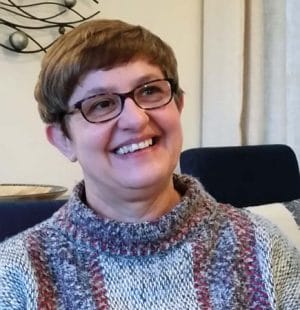
Jul 13, 2017 | Focolare Worldwide, Senza categoria
 Elisa lives in the Focolare Centre in Welwyn Garden City, 35km north of London, in the County of Hertfordshire. It is a “garden city”, founded in the 1920s, with graceful neo-Georgian buildings, roses around the porches, tree-lined avenues. She recounts: “I was born in Northern Italy in a small village. The nearest city was Novara. I am the eldest and I have two brothers. My family was a very Christian family and gave us all solid values, such as always thinking of others. I was twenty, I had just finished studying and I was looking for a job. I studied French and English. Finding a job in a small town was difficult and I was very discouraged. Then a friend invited me to a meeting where plans were being made to go to a Genfest in Rome, a huge youth festival of the Focolare Movement at the Flaminio Stadium. It was May 1980. I went just to get away for the weekend. Instead I was was taken aback by the scene that met me, posters talking about a united world and tens of thousands of young people. During the first break I was in tears because I knew I had found something precious. I kept in touch with those people. I can’t put my finger on it but there was something that attracted me to the point that I went to every meeting. I started to visit the Focolare centre and gradually inside of I started to understand what I wanted to do with my life. It was to give my life to God through the Focolare. I got a job with Caritas, the social action of the Diocese. It was challenging and interesting. After three years I was asked by the Focolare to transfer to Bologna. But the priest tried to convince me not to leave. On that day, the Gospel reading at Mass said ‘Those who do not leave mother, father, fields… cannot be my disciples’. I felt as if Jesus was speaking directly to me. I left without delay. During the years 1985-1987, I attended the international school of formation in Loppiano (near Florence, Italy). And then … Africa! My first impression was like being in a film because everything was new and different. The next day I went into a chapel and I saw the tabernacle and I said: ‘You’re the same Jesus, I gave my life to you and I find you here too.’ Initially I spent one month in Fontem, Cameroon. Then I went to Nigeria and lived there for twenty years. In Lagos, in 1989, we started a project for girls who wanted to know more about the spirituality of unity. There was a religious sister who offered us accommodation in the staff quarters of her missionary hospital. Then a family gave us a house for five years free of charge. Later we found a piece of land and those same people, together with others, helped us build the first focolare house in Nigeria. Everything about that house came from providence. We started a small business making items in batik as one girl knew how to dye material. Someone in the community gave us some money in order to start it up. Everyone supported us and the project has helped countless girls over the years. In 2002 around one thousand people in Jos, northern Nigeria lost their lives in a clash between Muslims and Christians. No-one could understand how it had happened because these groups had always lived peacefully side by side. Our community asked if the Mariapolis could be held in Jos even though it was still a dangerous situation. There we spoke of dialogue, peace, reconciliation because there were a lot of physical wounds and emotional hurt. People had lost their businesses, places of worship had been destroyed. There was a lady invited by her sister and was one of the people inciting the boys from her village to fight against the rebels. At the end of the Mariapolis she said she had understood that violence was not the answer. The Bishop also came to the Mariapolis and was planning to undertake a reconciliation process for a month going from village to village. I subsequently went to Douala (Cameroon) where I lived for six years. Then, in 2013, I arrived in Great Britain and am now living in Welwyn Garden City. In my first year here it snowed from February to April! While externally everything is different, nothing has changed. Wherever God wants you to be, that is your home.” Source: New City Magazine (UK)
Elisa lives in the Focolare Centre in Welwyn Garden City, 35km north of London, in the County of Hertfordshire. It is a “garden city”, founded in the 1920s, with graceful neo-Georgian buildings, roses around the porches, tree-lined avenues. She recounts: “I was born in Northern Italy in a small village. The nearest city was Novara. I am the eldest and I have two brothers. My family was a very Christian family and gave us all solid values, such as always thinking of others. I was twenty, I had just finished studying and I was looking for a job. I studied French and English. Finding a job in a small town was difficult and I was very discouraged. Then a friend invited me to a meeting where plans were being made to go to a Genfest in Rome, a huge youth festival of the Focolare Movement at the Flaminio Stadium. It was May 1980. I went just to get away for the weekend. Instead I was was taken aback by the scene that met me, posters talking about a united world and tens of thousands of young people. During the first break I was in tears because I knew I had found something precious. I kept in touch with those people. I can’t put my finger on it but there was something that attracted me to the point that I went to every meeting. I started to visit the Focolare centre and gradually inside of I started to understand what I wanted to do with my life. It was to give my life to God through the Focolare. I got a job with Caritas, the social action of the Diocese. It was challenging and interesting. After three years I was asked by the Focolare to transfer to Bologna. But the priest tried to convince me not to leave. On that day, the Gospel reading at Mass said ‘Those who do not leave mother, father, fields… cannot be my disciples’. I felt as if Jesus was speaking directly to me. I left without delay. During the years 1985-1987, I attended the international school of formation in Loppiano (near Florence, Italy). And then … Africa! My first impression was like being in a film because everything was new and different. The next day I went into a chapel and I saw the tabernacle and I said: ‘You’re the same Jesus, I gave my life to you and I find you here too.’ Initially I spent one month in Fontem, Cameroon. Then I went to Nigeria and lived there for twenty years. In Lagos, in 1989, we started a project for girls who wanted to know more about the spirituality of unity. There was a religious sister who offered us accommodation in the staff quarters of her missionary hospital. Then a family gave us a house for five years free of charge. Later we found a piece of land and those same people, together with others, helped us build the first focolare house in Nigeria. Everything about that house came from providence. We started a small business making items in batik as one girl knew how to dye material. Someone in the community gave us some money in order to start it up. Everyone supported us and the project has helped countless girls over the years. In 2002 around one thousand people in Jos, northern Nigeria lost their lives in a clash between Muslims and Christians. No-one could understand how it had happened because these groups had always lived peacefully side by side. Our community asked if the Mariapolis could be held in Jos even though it was still a dangerous situation. There we spoke of dialogue, peace, reconciliation because there were a lot of physical wounds and emotional hurt. People had lost their businesses, places of worship had been destroyed. There was a lady invited by her sister and was one of the people inciting the boys from her village to fight against the rebels. At the end of the Mariapolis she said she had understood that violence was not the answer. The Bishop also came to the Mariapolis and was planning to undertake a reconciliation process for a month going from village to village. I subsequently went to Douala (Cameroon) where I lived for six years. Then, in 2013, I arrived in Great Britain and am now living in Welwyn Garden City. In my first year here it snowed from February to April! While externally everything is different, nothing has changed. Wherever God wants you to be, that is your home.” Source: New City Magazine (UK)

 Augustine provides us with one of the most valuable intuitions on prayer: “God’s ear hears the heart’s voice” (Comment on Psalm 148). Letting God’s ear rest on our heart, opening our heart to God’s ear: this is what it takes, this is the art of praying, an art, by the way, that’s for everyone. Actually, it’s not ours, but of the Spirit that God gives to us, the Spirit who prays in us, for we don’t know how or for what we should pray (cf Rm 8:26). […] Prayer is elevating the heart to God. But are we capable of that? Isn’t the range of our understanding too limited for our heart to be able to elevate itself to God? Isn’t the impulse of our heart too weak? Don’t burdens attach themselves to our heart and weigh on it, paralyze it and bring it down? What gives us the courage to claim: Our heart is turned to the Lord? His ear. He has lowered it to us. The Father listens to the Son. And the Son came down among us, into our flesh, into our heart. Within the heart of the Son, the Father listens to every beat of our heart, in the heart of the Son he finds our heart. In Him in whom we were made, loved, supported, gathered – the Father hears us. To elevate our heart means to leave it where it is and discover that where it is, with us, is the heart of God in the heart of his Son. Abandon yourself in Him and he will hold you. In Him, God’s ear is upon your heart; in Him your heart is at God’s ear. […] The opposite is just as true: God keeps his heart against your ear. He revealed, conveyed, gave, not something of Himself, but His Self. If you believe in him, if you adhere to Him, if you stick to Him, then you don’t hear a novelty, a directive, a command: you hear his heart. Stay near to Him until you discover this heart of yours. He’s in need of your patient listening in order to open your heart; actually, only patience comprehends love and learns love. He will reveal Himself to anyone who loves Him, and He makes His dwelling with that person (cf Jn 14:21-23). […] God has your heart at his ear, so that through your ear his heart penetrating your heart, might become your heart. The ear of God on your heart – the heart of God at your ear – like the alternating found in prayer. Only the pray-er knows God. Only the pray-er knows the human person. From Klaus Hemmerle, Con l’anima in ascolto, Guida alla preghiera,(Rome: Città Nuova Ed.,1989), 9-11.
Augustine provides us with one of the most valuable intuitions on prayer: “God’s ear hears the heart’s voice” (Comment on Psalm 148). Letting God’s ear rest on our heart, opening our heart to God’s ear: this is what it takes, this is the art of praying, an art, by the way, that’s for everyone. Actually, it’s not ours, but of the Spirit that God gives to us, the Spirit who prays in us, for we don’t know how or for what we should pray (cf Rm 8:26). […] Prayer is elevating the heart to God. But are we capable of that? Isn’t the range of our understanding too limited for our heart to be able to elevate itself to God? Isn’t the impulse of our heart too weak? Don’t burdens attach themselves to our heart and weigh on it, paralyze it and bring it down? What gives us the courage to claim: Our heart is turned to the Lord? His ear. He has lowered it to us. The Father listens to the Son. And the Son came down among us, into our flesh, into our heart. Within the heart of the Son, the Father listens to every beat of our heart, in the heart of the Son he finds our heart. In Him in whom we were made, loved, supported, gathered – the Father hears us. To elevate our heart means to leave it where it is and discover that where it is, with us, is the heart of God in the heart of his Son. Abandon yourself in Him and he will hold you. In Him, God’s ear is upon your heart; in Him your heart is at God’s ear. […] The opposite is just as true: God keeps his heart against your ear. He revealed, conveyed, gave, not something of Himself, but His Self. If you believe in him, if you adhere to Him, if you stick to Him, then you don’t hear a novelty, a directive, a command: you hear his heart. Stay near to Him until you discover this heart of yours. He’s in need of your patient listening in order to open your heart; actually, only patience comprehends love and learns love. He will reveal Himself to anyone who loves Him, and He makes His dwelling with that person (cf Jn 14:21-23). […] God has your heart at his ear, so that through your ear his heart penetrating your heart, might become your heart. The ear of God on your heart – the heart of God at your ear – like the alternating found in prayer. Only the pray-er knows God. Only the pray-er knows the human person. From Klaus Hemmerle, Con l’anima in ascolto, Guida alla preghiera,(Rome: Città Nuova Ed.,1989), 9-11.

 “Every life has hope.” This is the recurring theme of
“Every life has hope.” This is the recurring theme of Our adrenaline was really pumping just as we got on stage to give the best of ourselves, while fear and worry seemed to disappear as we encouraged each another. Several said: “We felt a strength from above that was supporting us and instilling faith in ourselves.” “The thing I learned was never to stop during the show because of a mistake: this made me think a lot. I’ll carry this into my daily life, always continuing on in spite of the failures.”
Our adrenaline was really pumping just as we got on stage to give the best of ourselves, while fear and worry seemed to disappear as we encouraged each another. Several said: “We felt a strength from above that was supporting us and instilling faith in ourselves.” “The thing I learned was never to stop during the show because of a mistake: this made me think a lot. I’ll carry this into my daily life, always continuing on in spite of the failures.” 
 It’s been 20 years since the honorary doctorate, and the Focolare community in Mexico organized three events in memory of her message and to fulfill it: the philosophy of being, the Church as communion, and inculturation. June 29, 2017: “The face of God as communion” was the title of the symposium held at the Pontifical University of Mexico. Msgr Piero Coda, Dean of the
It’s been 20 years since the honorary doctorate, and the Focolare community in Mexico organized three events in memory of her message and to fulfill it: the philosophy of being, the Church as communion, and inculturation. June 29, 2017: “The face of God as communion” was the title of the symposium held at the Pontifical University of Mexico. Msgr Piero Coda, Dean of the  hese two reflections urged those present, mostly priests and men and women religious, towards pastoral work that shows a Church that is merciful, synodal, humble and open. “What surfaced,” affirmed Msgr Coda, “is the need to maintain an open dialogue with the vibrant strength that is in the Mexican church, to enthusiastically take up the challenge of pastoral change as advocated by Pope Francis. This encourages efforts by the laity at a cultural and societal level, working closely with young people, and the work of synods in the Church, where charisms can give their contribution.” June 30, 2017: Welcoming everyone to the hall at La Salle University in Mexico City, Dr Enrique Alejandro González Alvarez, dean of the university, explained the importance of the honoris causa doctorate conferred on Chiara Lubich in 1997. “Through her acceptance, it was she who honored the university,” he said, pointing to the profound harmony between the charism of unity and that of La Salle. “The University identifies with the Focolare Movement, because we work as allies to bring the kingdom of God here on earth, which without a doubt was Chiara’s primary mission,” Alvarez said. “May we continue to tighten the bonds that unite us. This is not only Chiara Lubich’s home, but of all who carry on in her spirit, so that today she can continue to live through her followers.” For the occasion Msgr Coda conducted a conference on “Chiara Lubich’s contribution to a new philosophy of being.” “Chiara’s speech 20 years ago,” Coda said, “showed itself to be prophetic for Mexico, as a new search for meaning and light, and the need for a new cultural paradigm at the social and cultural level. So her talk gave direction and can be connected to the commitment of Sophia University Institute.” New contacts and plans to collaborate were established between Sophia University Institute, the Pontifical University of Mexico and La Salle University.
hese two reflections urged those present, mostly priests and men and women religious, towards pastoral work that shows a Church that is merciful, synodal, humble and open. “What surfaced,” affirmed Msgr Coda, “is the need to maintain an open dialogue with the vibrant strength that is in the Mexican church, to enthusiastically take up the challenge of pastoral change as advocated by Pope Francis. This encourages efforts by the laity at a cultural and societal level, working closely with young people, and the work of synods in the Church, where charisms can give their contribution.” June 30, 2017: Welcoming everyone to the hall at La Salle University in Mexico City, Dr Enrique Alejandro González Alvarez, dean of the university, explained the importance of the honoris causa doctorate conferred on Chiara Lubich in 1997. “Through her acceptance, it was she who honored the university,” he said, pointing to the profound harmony between the charism of unity and that of La Salle. “The University identifies with the Focolare Movement, because we work as allies to bring the kingdom of God here on earth, which without a doubt was Chiara’s primary mission,” Alvarez said. “May we continue to tighten the bonds that unite us. This is not only Chiara Lubich’s home, but of all who carry on in her spirit, so that today she can continue to live through her followers.” For the occasion Msgr Coda conducted a conference on “Chiara Lubich’s contribution to a new philosophy of being.” “Chiara’s speech 20 years ago,” Coda said, “showed itself to be prophetic for Mexico, as a new search for meaning and light, and the need for a new cultural paradigm at the social and cultural level. So her talk gave direction and can be connected to the commitment of Sophia University Institute.” New contacts and plans to collaborate were established between Sophia University Institute, the Pontifical University of Mexico and La Salle University.
 heard on TV… I’m watching the news, continually being interrupted by appeals from the public utility commission. The last one just said: “Urgently needed pharmacy drug…” My God! I jot down the telephone number and call. They tell me that person in need is an elderly woman, that it’s really urgent and that she lives in the same city as me. I quickly contact the lady’s children, but in this moment the situation on the streets doesn’t allow me to go out. We agree to meet the next day, early in the morning, in fron of the community health centre. When we finally meet, the lady asks me: “How much does the medicine cost?” I asked for it from the United States, but they weren’t able to send it to me.” “Nothing, ma’am,” I answer. “Let’s pray together that peace quickly returns to Venezuela.” We don’t know each other but hug and say goodbye. There is more happiness in giving than in receiving My friend calls me: “Do you by any chance have this medicine? I can’t find it anywhere . . .” It happened to be just the medicine that a woman had donated to my parish. In that moment I had thought: “But will this be useful to anyone?” It’s a very specific medicine…” It was jus the one my friend needed, with the exact dosage information – and there were 50 pills! God knows what each person needs. The happiness was shared, but mine was greater.
heard on TV… I’m watching the news, continually being interrupted by appeals from the public utility commission. The last one just said: “Urgently needed pharmacy drug…” My God! I jot down the telephone number and call. They tell me that person in need is an elderly woman, that it’s really urgent and that she lives in the same city as me. I quickly contact the lady’s children, but in this moment the situation on the streets doesn’t allow me to go out. We agree to meet the next day, early in the morning, in fron of the community health centre. When we finally meet, the lady asks me: “How much does the medicine cost?” I asked for it from the United States, but they weren’t able to send it to me.” “Nothing, ma’am,” I answer. “Let’s pray together that peace quickly returns to Venezuela.” We don’t know each other but hug and say goodbye. There is more happiness in giving than in receiving My friend calls me: “Do you by any chance have this medicine? I can’t find it anywhere . . .” It happened to be just the medicine that a woman had donated to my parish. In that moment I had thought: “But will this be useful to anyone?” It’s a very specific medicine…” It was jus the one my friend needed, with the exact dosage information – and there were 50 pills! God knows what each person needs. The happiness was shared, but mine was greater. 
